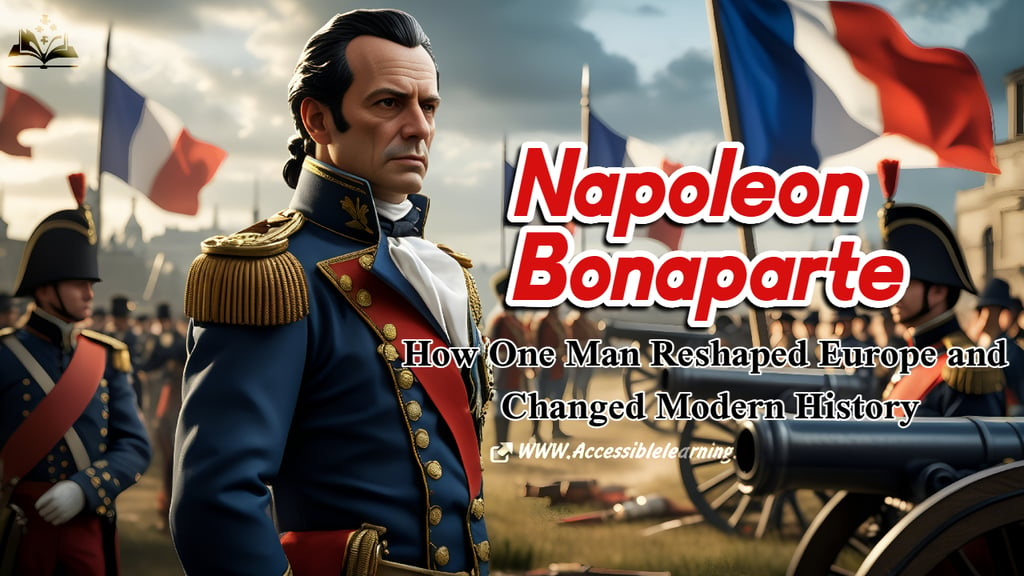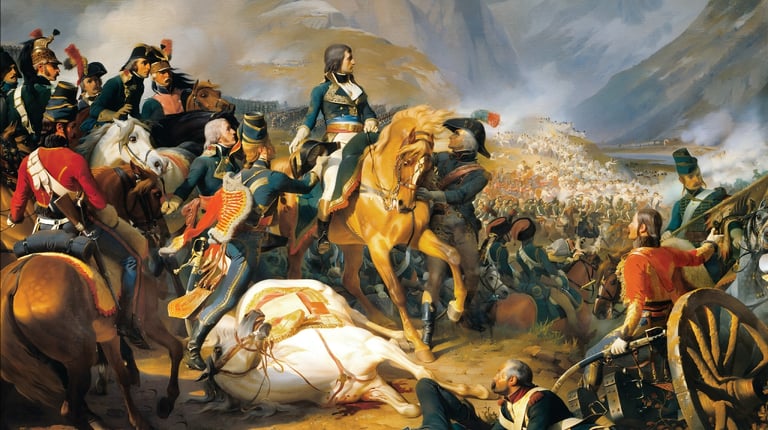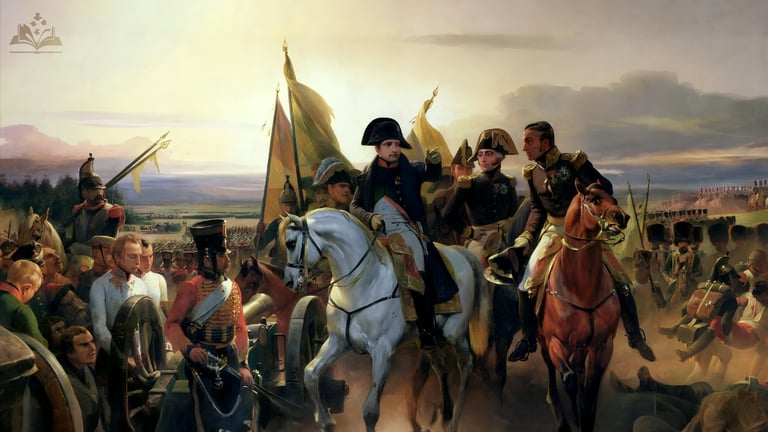
Napoleon Bonaparte: How One Man Reshaped Europe and Changed Modern History
An in-depth exploration of one of history's most influential figures, from his humble Corsican origins to his unprecedented rise to power, groundbreaking reforms, military conquests, and ultimate downfall. This comprehensive analysis examines Napoleon's complex legacy that continues to shape our modern world more than two centuries after his death.
EMPIRES/HISTORYFRANCEHISTORYEUROPEAN UNION
Kim Shin
3/12/202510 min read


Napoleon Bonaparte remains one of history's most fascinating and controversial figures. A brilliant military strategist, visionary leader, and complex personality, his impact on France and the world continues to resonate more than two centuries later. From his humble beginnings in Corsica to his final days in exile, Napoleon's life story encapsulates remarkable achievement, unprecedented ambition, and ultimate downfall.
Early Life and Education
Born on August 15, 1769, in Ajaccio, Corsica, Napoleon came from modest nobility on an island that had only recently been transferred from Genoa to France. This Corsican heritage instilled in him a fierce independence and outsider perspective that would influence his outlook throughout life.
At just nine years old, Napoleon left his Mediterranean home to attend military school in mainland France. First at Brienne-le-Château and later at the prestigious École Militaire in Paris, he distinguished himself through mathematical aptitude and disciplined study. These formative years were challenging—Napoleon faced discrimination for his Corsican accent and modest background—but they shaped his resilience and determination.
His father, Carlo Bonaparte, was a lawyer and political opportunist who secured the family's minor noble status, while his mother, Letizia Ramolino, was known for her discipline and strength of character. Napoleon was one of eight surviving siblings, many of whom would later be appointed to royal positions across Europe during his reign.
Rise Through Military Ranks
Napoleon's military career began modestly as a second lieutenant in the French artillery. However, his fortunes improved dramatically during the tumultuous years following the French Revolution. In 1793, his tactical brilliance at the Siege of Toulon against British forces caught the attention of senior leadership. By orchestrating a daring artillery assault that forced British withdrawal, Napoleon earned promotion to brigadier general at just 24 years old.
His meteoric rise continued in 1795 when he suppressed royalist rebels in Paris with what he famously called a "whiff of grapeshot." This decisive action secured the revolutionary government and Napoleon's position within it. By 1796, he received command of the Army of Italy, where he transformed an underfunded, demoralized force into a formidable fighting unit through inspirational leadership and strategic innovation.
During this period, Napoleon developed his characteristic leadership style—a blend of meticulous planning, swift decision-making, and personal courage that inspired loyalty. He also demonstrated remarkable physical endurance, often going days with minimal sleep during campaigns while maintaining mental sharpness.


Military Genius in Action
The Italian campaign of 1796–97 established Napoleon's reputation as a military mastermind. Facing numerically superior Austrian and Sardinian armies, he employed a revolutionary approach: rapid movement, concentration of forces at decisive points, and bold offensive action. Rather than adhering to the conventional wisdom of securing supply lines, Napoleon's forces lived off the land, enabling unprecedented mobility.
His Egyptian campaign (1798–1799), while ultimately unsuccessful militarily, demonstrated his broader vision of combining military conquest with scientific and cultural advancement. The expedition included over 150 scientists, scholars, and artists who documented Egyptian civilization and made discoveries like the Rosetta Stone.
Napoleon's military innovations extended to artillery deployment—his specialty from early training. He used concentrated artillery barrages to create gaps in enemy lines, followed by rapid infantry assaults and cavalry exploitation. This combined-arms approach, executed with precise timing, overwhelmed opponents who still employed more rigid, linear tactics.
From General to Emperor
Napoleon's political ascent paralleled his military success. Returning from Egypt in 1799, he participated in the coup of 18 Brumaire that overthrew the Directory government. Initially serving as First Consul in a triumvirate, Napoleon gradually consolidated power until declaring himself Emperor of the French in 1804.
His coronation at Notre Dame Cathedral marked a stunning transformation—from revolutionary general to imperial monarch in just a decade. Yet Napoleon presented himself as a leader who had risen through merit rather than birth, maintaining popular support by preserving many revolutionary ideals while restoring order and stability.
The transition from republic to empire was carefully orchestrated with a public referendum that overwhelmingly approved the change. Napoleon's self-coronation—taking the crown from Pope Pius VII and placing it on his own head—symbolized his view that his authority derived from the French people and his own achievements rather than divine right or religious sanction.
Domestic Reforms and Legacy
Napoleon's domestic achievements rival his military conquests in historical significance. The Napoleonic Code, established in 1804, standardized French law and became a model for civil legal systems worldwide. This comprehensive code enshrined principles of equality before the law, religious tolerance, and meritocracy.
Educational reforms created a system of lycées and centralized universities that democratized access to education and standardized curriculum. His establishment of the Bank of France stabilized the economy after revolutionary turmoil, while infrastructure projects—roads, bridges, and canals—modernized the nation.
The administrative system Napoleon implemented, with its prefects, centralized bureaucracy, and efficient tax collection, proved so effective that much of it remains in place in modern France.
Perhaps less recognized but equally significant were Napoleon's cultural initiatives. The Louvre Museum was expanded with artwork acquired (some would say plundered) during military campaigns. The metric system was standardized and implemented across France. Napoleon also established the Legion of Honor, which continues today as France's highest order of merit for both military and civilian achievement.
The Grande Armée and European Domination
Between 1805 and 1812, Napoleon achieved his greatest military triumphs. At Austerlitz (1805), he decisively defeated the combined Austrian and Russian armies through brilliant maneuver and timing. The battles of Jena-Auerstedt (1806) humbled Prussia, while Friedland (1807) forced Russia to negotiate.
At his height, Napoleon controlled, directly or indirectly, most of continental Europe. He reorganized the map, creating satellite kingdoms and the Confederation of the Rhine. His Continental System attempted to isolate and economically strangle Britain, his most persistent enemy.
The Grande Armée that accomplished these victories represented military innovation at multiple levels—corps organization that balanced centralized command with operational flexibility, combined arms tactics, and meritocratic promotion that produced talented marshals like Davout, Lannes, and Masséna.
Napoleon's army was distinguished by its diversity, incorporating troops from throughout the expanding French empire and allied states. This multinational force developed esprit de corps through shared hardship, victory, and devotion to their emperor. Napoleon personally cultivated this relationship with his soldiers, famously memorizing names and battlefield exploits of individual veterans and sharing their hardships on campaign.


Personal Life & Relationships
Behind the public figure existed a complex private man. Napoleon's first marriage to Joséphine de Beauharnais was a passionate love match that eventually gave way to political necessity when she could not provide an heir. His letters to her during early campaigns reveal a romantic intensity at odds with his calculating public persona.
His second marriage to Marie-Louise of Austria—a Habsburg princess and niece of Marie Antoinette—was purely political but produced the desired heir, Napoleon II (known as the King of Rome). Napoleon was devoted to his son but spent little time with him before exile.
Napoleon maintained a small circle of loyal friends from his early military days who received positions of responsibility but not unchecked power. His family relationships were complicated; he placed his siblings on various European thrones but frequently clashed with them when they prioritized their kingdoms' interests over his imperial vision.
The Beginning of the End: The Russian Campaign
The invasion of Russia in 1812 marked the turning point of Napoleon's fortunes. With over 600,000 troops—the largest European army assembled until that point—Napoleon advanced deep into Russian territory. However, the Russian strategy of continuous retreat, combined with scorched earth tactics, stretched French supply lines to breaking point.
When Napoleon finally entered Moscow in September, he found a largely abandoned city that was soon engulfed in flames. Without a Russian surrender and facing the onset of winter, he ordered a retreat that became one of history's most catastrophic military disasters. Weather, disease, starvation, and constant harassment by Russian forces reduced the Grande Armée to a fraction of its original strength.
The Russian campaign exposed the limits of Napoleon's military system. The vast distances negated his advantage in rapid maneuver, while the scorched earth tactics eliminated his army's ability to live off the land. Perhaps most critically, it revealed Napoleon's fatal flaw—the inability to accept limited victories and strategic compromises that might have preserved his gains.
Downfall and First Exile
Following the Russian debacle, a reinvigorated coalition of European powers—Britain, Russia, Prussia, Austria, and Sweden—united against the weakened emperor. Though Napoleon demonstrated remarkable resilience by raising new armies and winning several engagements in 1813, the overwhelming numbers of the coalition ultimately prevailed.
After the defeat at Leipzig (the "Battle of Nations") and the subsequent invasion of France, Napoleon abdicated on April 11, 1814. The victorious allies exiled him to Elba, a small Mediterranean island, where he was granted sovereignty over the territory.
On Elba, Napoleon immediately set about governing his miniature domain, creating infrastructure and administrative systems with characteristic energy. He maintained a 1,000-man guard and received visitors and intelligence from France. Meanwhile, the restored Bourbon monarchy under Louis XVIII was alienating various segments of French society, particularly veterans of Napoleon's armies who felt dishonored and marginalized.
The Hundred Days and Waterloo
Napoleon's first exile proved remarkably brief. In February 1815, he escaped from Elba and landed in France, where he received an enthusiastic welcome from many citizens and former soldiers. The restored Bourbon monarch Louis XVIII fled as Napoleon entered Paris, beginning the period known as the Hundred Days.
European powers declared Napoleon an outlaw and mobilized new armies against him. On June 18, 1815, near the Belgian village of Waterloo, Napoleon faced a combined British and Prussian force commanded by the Duke of Wellington and Marshal Blücher. After an intensely fought battle that hung in the balance throughout the day, Napoleon suffered a decisive defeat that permanently ended his military and political career.
The Battle of Waterloo featured several controversial decisions by Napoleon, including delaying the initial attack to allow muddy ground to dry and entrusting key corps to less experienced commanders. His strategic gambit—a frontal assault on the British center after artillery bombardment—failed when Wellington's troops held firm in defensive squares against repeated cavalry charges. The timely arrival of Prussian forces under Blücher delivered the final blow to French hopes.

Final Exile and Death
Following Waterloo, Napoleon surrendered to British forces. This time, taking no chances on another return, the allies exiled him to Saint Helena—a remote island in the South Atlantic, over 1,100 miles from the nearest landmass. There, under British supervision, Napoleon spent his final years dictating his memoirs and constructing a carefully curated version of his life story that would influence historical perception for generations.
His health gradually deteriorated in the island's damp climate. Napoleon died on May 5, 1821, at age 51. While the official cause was stomach cancer, some historians have suggested arsenic poisoning, though evidence remains inconclusive.
Life on Saint Helena was a stark contrast to his former glory. Napoleon resided at Longwood House, a damp and windswept dwelling that exacerbated his health problems. His companions included loyal officers like Grand Marshal Bertrand and General Montholon, along with their families. His British jailer, Sir Hudson Lowe, maintained strict surveillance and restrictions that Napoleon considered beneath his dignity as a former sovereign.
An autopsy revealed a perforated stomach ulcer, though persistent theories about arsenic poisoning gained some credence when tests on preserved hair samples in the 20th century showed elevated arsenic levels. However, this may have resulted from common household products of the era rather than deliberate poisoning.
Historical Assessment & Legacy
Napoleon's historical legacy defies simple categorization. To some, he represents the enlightened despot who modernized governance, codified revolutionary principles, and brought rational administration to Europe. To others, he exemplifies the dangers of unchecked ambition and military adventurism that resulted in millions of deaths across the continent.
His military innovations transformed warfare, influencing military doctrine well into the 20th century. The Napoleonic Code has shaped legal systems from Europe to Latin America and parts of Africa. Even his enemies adopted many of his administrative innovations.
Napoleon understood the power of image and propaganda, carefully crafting his public persona. The numerous portraits, busts, and monuments he commissioned ensured his physical image would become instantly recognizable worldwide. His personal charisma and ability to connect with ordinary soldiers created a personality cult that persisted long after his death.
The "Napoleonic Legend" gained momentum after his death, particularly during periods of French political instability. His nephew Louis-Napoleon leveraged this nostalgia to become President of the Second Republic and later Emperor Napoleon III. Romantic writers and artists frequently portrayed Napoleon as a tragic hero—a man of destiny brought down by forces beyond his control rather than by his own overreaching ambition.
Napoleon's final testament included the wish that his "ashes rest on the banks of the Seine, among the French people whom I loved so much." This wish was granted in 1840 when his remains were returned to France and entombed with elaborate ceremony at Les Invalides in Paris, where they continue to attract over a million visitors annually.
The Napoleonic Wars' Global Impact
The Napoleonic era had consequences far beyond Europe. The Louisiana Purchase of 1803, where Napoleon sold France's North American territories to the United States, dramatically expanded American territory and influence. The dissolution of the Spanish Empire, accelerated by Napoleon's occupation of Spain, created openings for independence movements throughout Latin America led by figures like Simón Bolívar.
The disruption of trade during the Continental System and British blockade stimulated industrial development in regions cut off from traditional suppliers. Meanwhile, the ideals of liberty, equality, and nationalism that French armies carried across Europe (despite Napoleon's increasingly autocratic rule) catalyzed reform movements and revolutionary aspirations that would reshape 19th-century politics.
Napoleon Bonaparte's extraordinary life trajectory—from obscure Corsican nobility to Emperor of France, from military genius to defeated exile—continues to captivate our imagination. His complex legacy encompasses progressive legal reform and brutal warfare, meritocratic principles, and autocratic rule.
Whatever one's assessment of Napoleon's character or actions, his profound impact on European history, military strategy, legal systems, and political structures remains undeniable. The Napoleonic era forced a fundamental reconsideration of governance, national identity, and the relationship between state and citizen that helped shape our modern world. Two centuries after his death, we still live in a world partially defined by the changes this remarkable figure set in motion.
As historian Andrew Roberts noted, "The ideas that underpin our modern world—meritocracy, equality before the law, property rights, religious tolerance, modern secular education, sound finances, and so on—were championed, consolidated, codified, and geographically extended by Napoleon. To them he added a rational and efficient local administration, an end to rural banditry, the encouragement of science and the arts, the abolition of feudalism, and the greatest codification of laws since the fall of the Roman Empire."
Subscribe To Our Newsletter
All © Copyright reserved by Accessible-Learning Hub
| Terms & Conditions
Knowledge is power. Learn with Us. 📚


